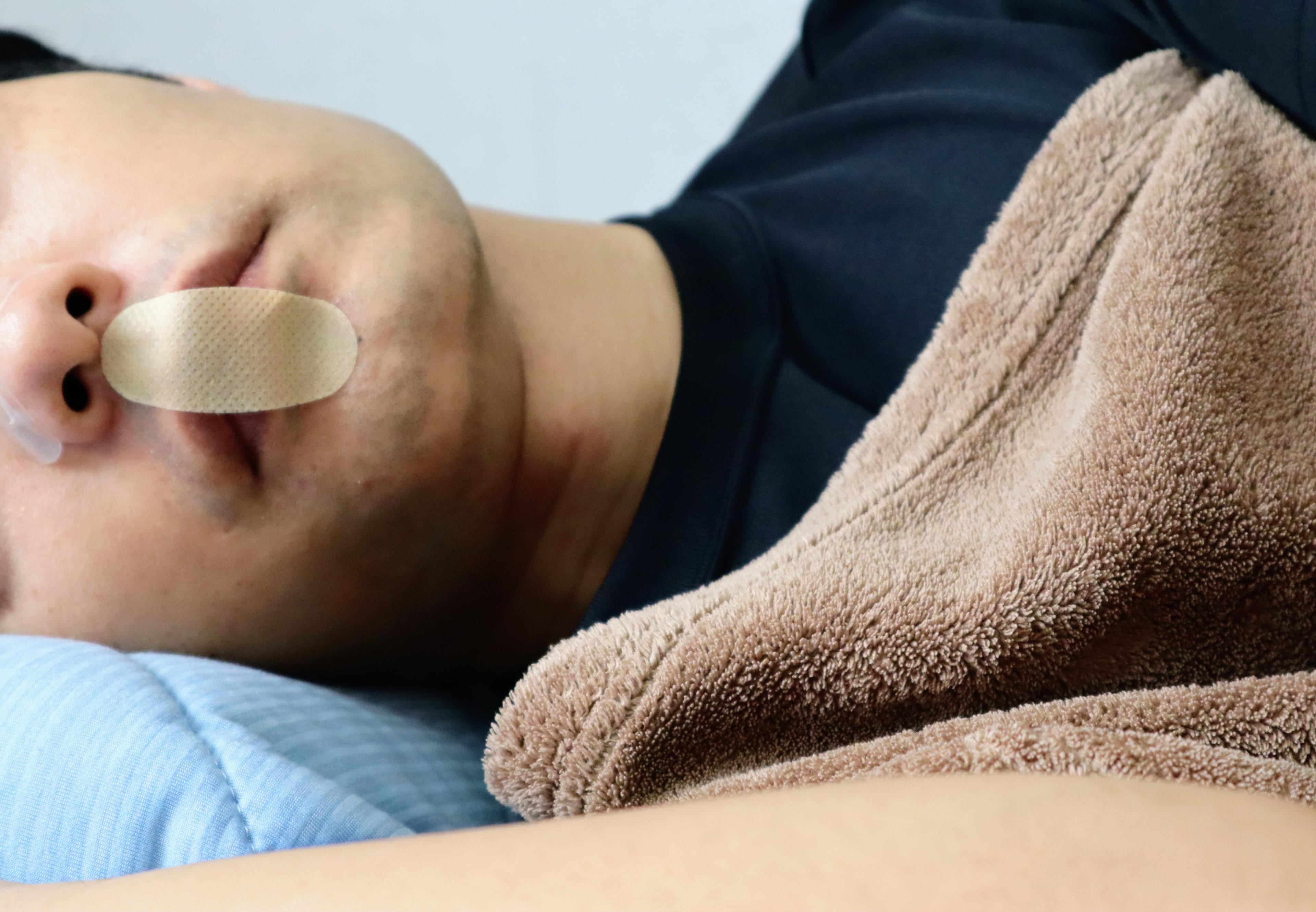Is Mouth Taping for Sleep Helpful or Harmful?

Jake Newby
| 4 min read
Jake Newby is a brand journalist for Blue Cross Blue...

One of the most popular social media sleep trends of the past year or so involves placing medical adhesive tape over the lips at night to prevent an individual from breathing through their mouth while sleeping. It’s called mouth taping, and if you ask some TikTok influencers, it’s a life-changing sleep hack. Some have even gone as far as to imply that mouth taping has improved their breathing by changing the structure of their face.
But medical experts aren’t convinced that this health and wellness trend deserves to stick around.
The proposed upside of mouth taping is to help you avoid issues linked to mouth breathing overnight, which can affect overall health by drying out the gums and tissue lining in the mouth. It can also contribute to snoring, a sore or irritated throat, bad breath, and daytime sleepiness the next day. Causes of mouth breathing may include nasal allergies and enlarged adenoids, which are patches of tissue found in the back of the throat.
What are the perceived benefits of mouth taping?
The benefits of mouth taping overlap with the benefits of nose breathing. When you tape your mouth shut during sleep you force your nose to do all the breathing work. The benefits of breathing through the nose include:
- Nasal passage protection when the tiny hairs in your nose called the cilia filter out toxins like allergens, dust and pollution that enter the nose through breathed air.
- Warm and humified air: As the noise adds warmth and moisture to inhaled air, which promotes better lung and throat function.
- Controls the temperature of air so the air reaching your lungs is not too hot or too cold.
Some people also try mouth taping because they believe it can control chronic or heavy snoring.
What are the risks of mouth taping?
While a handful of small studies have found mouth taping to be helpful for people with mild cases of sleep apnea, most research suggests it does the opposite, and can promote or exacerbate sleep apnea. Medical experts advise against it.
“This is just as bad as it sounds,” said Dr. Angela Seabright, D.O., care management physician at Blue Cross Blue Shield of Michigan, during a 2023 A Healthier Michigan podcast appearance. “You’re taping your mouth shut, which is basically forcing your body to primarily breathe primarily through your nose. We should never have to force our body to do something.
“We know nose breathing is better, so, they’ve got that down,” Dr. Seabright continued. “…But we really don’t have evidence to support (mouth taping) and any evidence is purely anecdotal.”
Negative anecdotal side effects of mouth taping include disrupted sleep due to irritation from the tape, difficulty breathing through the nose and anxiety for those who struggle with the idea of their mouth being taped shut. Mouth taping can also be dangerous for people who struggle to breathe through their nose throughout the day. Chronic conditions such as a deviated septum, nasal polyps, sinusitis or chronic congestion may make forced nasal breathing at night a real struggle.
Mouth taping alternatives
Before doing anything else, those thinking of mouth taping should talk to their primary care provider (PCP) about what may be causing their issue. Your PCP can help you get to the bottom of a possible sleep disorder or advise certain tests that test for mouth breathing issues, so you can then begin treatment.
Additionally, if you believe breathing problems are disrupting your sleep, examine any possible allergies you have. Reducing indoor allergens- that commonly live in laundry rooms, bedrooms, kitchens, bathrooms and basements – potentially through the use of HVAC systems and/or air filtration systems – is something to explore.
If you are a back sleeper, you could try sleeping on your side, a position that helps keep the nasal airways open and thus reduces snoring. It’s also always important to assess your sleep hygiene and whether you’re taking the right steps to set yourself up for good, consistent sleep. Practicing good sleep hygiene includes:
- Going to bed and waking up at the same time each night, even on weekends.
- Avoiding screen time 1 to 2 hours before bed.
- Avoiding alcohol and caffeine multiple hours before bed.
- Making sure your bedroom is at an optimal temperature and is free of light and noise.
- Getting regular exercise during the day to regulate energy levels.
Photo credit: Getty Images
Related:





